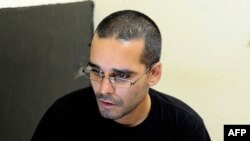Angolan dissident rapper and activist Luaty Beirao ended a 36 day-hunger strike Tuesday following pleas from his wife and fellow detainees. “It is a feeling of victory,” said his family and attorney, Luis Nascimento.
Beirao went on the strike to try to force authorities to release him and other detainees from prison until their trials. Beirao's trial is scheduled for mid-November. He is one of 16 activists arrested in June for allegedly conspiring to overthrow Angola’s President Jose Eduardo dos Santos.
The detained activists, who belong to a youth movement, had previously held demonstrations demanding that dos Santos, who’s been in power for 36 years, step down. They were arrested while having a book discussion about an American study of more than 40 years of nonviolent demonstration.
Beirao was hospitalized October 15 as his condition worsened. He stopped eating after his custody was extended beyond the 90 days permitted by law.
In a letter addressed to his fellow activists, Beirao didn't explain the reason for his decision to end his hunger strike but said he wanted to return to prison so the group could all talk with one voice.
However, radio, video and music producer Pedro Coquenao, a friend of Beirao who daily visited the activist at the clinic, told the VOA Portuguese service that Beirao decided to stop his hunger strike because he had succeeded in bringing the situation in Angola to the attention of international entities, public figures and everyday citizens.
A family member told VOA Portuguese that the rapper-activist didn’t get any assurance that the group's trials, scheduled for Nov. 16-20, would be fair.
Mariana Abreu of the Southern Africa Regional Office of Amnesty International said repression of dissent in Angola had increased. And while the human rights organization was pleased that Beirao is out of danger, “let’s not forget that the 16 detainees are prisoners of conscience and they need to be released unconditionally and immediately,” Abreu said.
Abreu called the group prisoners of conscience because, she said, they’ve not committed any crime. They were imprisoned solely for their political opinions and for exercising their freedom of expression and association, which is a human right, she said.
Joao Pinto, a member of parliament from the ruling People's Movement for the Liberation of Angola, told VOA Portuguese nothing would change in the case against the activists, who, he said, are being used by opposition parties to destabilize the country. Pinto described Beirao’s hunger strike as blackmail against judicial power and the country’s institutions.
Amnesty’s Abreu disagreed, saying her organization had been in touch with the activists before and during the ordeal and had been assured that they were not part of the opposition.
“These are young people who questioned the government, something normal in any democracy," she said. "There is nothing wrong with reading a book on democracy; it is not an attempt to overthrow president dos Santos.”
Amnesty International is meeting with the Angolan Embassy in Portugal on Wednesday to discuss freedom of expression in general as well as this issue in particular.
Mayra Fernandes and Mariama Diallo contributed to the report from Washington




